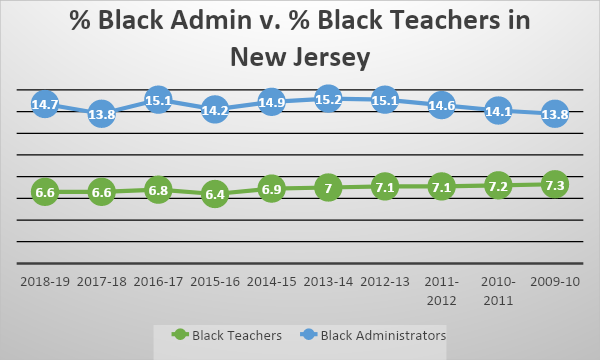
Oct 22, 2019 12:00:00 AM
by Rann Miller
When we hire White teachers, their quality is generally assumed rather than questioned. But when we look at Black educators, their quality is generally questioned. In the context of hiring Black teachers, “quality” is one of those buzzwords that assumes the inferiority of Black teachers when compared to White teachers. Whether or not folks realize it, the word is used to reinforce a racist ideology.
Here’s an example.
Last year, I was part of a school district task force dedicated to addressing issues affecting students of color. The district, like many others, has seen its student demographics shift from majority White to predominantly Black and Latinx. The task force created goals around improving student academic performance, better connecting with families and recruiting more teachers of color.
At one task force meeting, I recommended the district hire additional Black teachers and cited research to explain why this is so important. Students across all racial and ethnic groups prefer Black teachers, and Black students have a higher likelihood of attending college when they’ve had one Black teacher. [pullquote position="right"]These realities alone should encourage district officials to hire additional Black teachers.[/pullquote]
But a White female teacher pushed back. Assuming I was calling for firing White teachers, she said that the district couldn’t push out current teachers out to fulfill this mandate. That wasn’t what I had suggested, but I digress.
Her next words annoyed me even more.
Here’s a summary of her argument: Even if we have an opportunity to increase teachers of color, we need to make sure that they are quality teachers.
It’s not the first time I’ve heard a White educator make that statement. Why, when the subject of hiring more educators of color arises, do White educators immediately question their quality? It makes me wonder if some White educators think that when we call for additional Black teachers, it means hiring the first Black folks we see on the street.
Equally interesting is the notion that Black people tend to hire based on race, however when we look around spaces such as schools, White people make up the majority of workers, but I digress.
It goes without saying that we all want quality teachers in our schools. But I ask you, [pullquote]can we really say that the 80% of our teachers nationwide who are White are all “quality” teachers?[/pullquote] Can we say with confidence that this mass of White teachers is the best of the best?
When a White teacher is hired, do we take the same tone around emphasizing that a quality hire was made? Do we allow Black teachers to exist in educational spaces in the same way we do White teachers? Clearly, the answer is no.
The same way we should not assume that all Black teachers are mediocre, we shouldn’t assume that mediocre White teachers don’t exist in schools. High-quality, mediocre and low-quality teachers can be found in all colors, shapes and sizes. Yet White teachers, no matter their quality, are allowed to exist in schools unquestioned, while Black teachers simply aren’t. Their “quality” is in question when they arrive to work.
It is also assumed Black teachers are only good for disciplining Black students, primarily because non-Black teachers aren’t as invested in them. Too often, their contributions are overlooked, while those of their White colleagues are celebrated.
In order to ensure that they are heard, many Black teachers enter administration. There, they must be listened to by everyone, no matter their position. This is one of the reasons why I left the classroom, first to become a vice principal, and now a director in my district.
I’m not alone. The numbers show the trend. For example, In New Jersey during the previous school year, according to the state department of education, there were more Black administrators (14.7%) than there were Black teachers (6.6%). Black administrators are more in proportion to the number of Black students statewide, which is 15.6%. In fact, over the last five years, the percentage of Black administrators to Black teachers was more than doubled.

*Source: New Jersey Department of Education
Maybe this is why school districts are losing Black teachers as fast as they hire them.
Maybe, those wanting to keep Black teachers out of schools think the more they stress the point that Black teachers have to be “quality” teachers, the more likely people will believe that Black people don’t make quality teachers and thus, they will be less likely to hire them.
But what about in the classroom? Are Black teachers quality teachers? In the case of New Jersey, they must be since more Black educators are administrators than teachers and you must have five years teaching experience to be an administrator.
However, public schools tend to be White institutional spaces—nominally open organizations that continue to discriminate in more subtle ways, from micro-aggressions to racist assumptions about inferiority to testing Black people’s willingness to serve the interests of the White status quo. In her research, Dr. Wendy Moore of Texas A & M University explains in detail how this plays out in majority-White, evangelical churches. But the mechanisms—structure, culture, ideology and discourse—that perpetuate White privilege, White power and White resource hoarding also operate in schools.
This may explain why, according to a Michigan State University study, teachers of color are disproportionately more likely to be rated minimally ineffective or ineffective on evaluations than their White counterparts.
In the state of Michigan, nearly 19% of Black teachers received a low evaluation rating from 2011-12 to 2015-16, compared to just 7% of White teachers—teachers of color in schools with a predominately White faculty are even more likely to receive low scores. The study also found that Black teachers are less likely to receive low ratings in schools with higher percentages of Black teachers. [pullquote position="left"]White institutional spaces, such as schools, can and do determine the success of Black people in those spaces.[/pullquote]
Black teachers know that they are perceived as subpar educators. Even the idea that Black teachers are most necessary to teach Black students creates a racist idea that Black teachers cannot teach all children. We know that’s not the truth. Black teachers face racism, leaving them isolated. Yet they do the work. In fact, they tend to be overburdened, doing more than other teachers because they are Black.
Unfortunately, Black teachers can’t exist as teachers. They have to prove they are “quality” to get the job and they have to keep on proving it in order to stay. Meanwhile, White teachers, no matter their quality, are protected because of self-perpetuating structures and systems long-established in schools.Attaching color with quality is a timeless racist idea that remains relevant to keeping White spaces White. Unfortunately, when it comes to hiring a “quality” teacher, colorblindness doesn’t apply. I echo the words of Marybeth Gasman of Rutgers University, with respect to K-12 institutions: They don’t really want to hire Black teachers, or keep them, either.
Rann Miller is a director of a federally funded after-school and summer program in southern New Jersey. He spent six years teaching in charter schools in Camden, New Jersey. Rann is the creator, writer and editor of the Official Urban Education Mixtape Blog. His writing on race and urban education has appeared in Salon, AlterNet, and the Progressive, where he is an education fellow.
Few issues in education spark more tension and debate than standardized testing. Are they a tool for equity or a burden on students? A necessary check on school systems or a flawed measure of...
Charter schools are public schools with a purpose. Operating independently from traditional school districts, they're tuition-free, open to all students, and publicly funded—but with more flexibility...
Despite the benefits of a diverse teaching force, prospective teachers of color fall out of our leaky preparation pipeline at every stage: preparation, hiring, induction, and retention. Here’s what...
Ed Post is the flagship website platform of brightbeam, a 501(c3) network of education activists and influencers demanding a better education and a brighter future for every child.
© 2020-2025 brightbeam. All rights reserved.
Leave a Comment